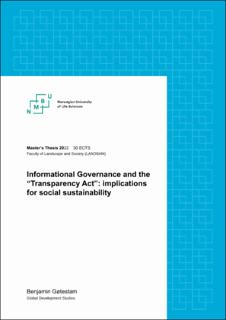| dc.contributor.advisor | Grimsby, Lars Kåre | |
| dc.contributor.author | Gøtestam, Benjamin | |
| dc.date.accessioned | 2022-12-12T09:06:48Z | |
| dc.date.available | 2022-12-12T09:06:48Z | |
| dc.date.issued | 2022 | |
| dc.identifier.uri | https://hdl.handle.net/11250/3037148 | |
| dc.description.abstract | This thesis looks at what implications information used as a policy instrument may have on the social sustainability in the global food system, looking at the Norwegian “Transparency Act”. To investigate this topic, data were collected through interviews with relevant corporations, organizations, and the supervisory authority, as well through an analysis of the responses to the public hearing on the Ethics Information committee’s report. The findings indicate that information used as a policy instrument show more potential when utilized by collective actors, rather than individuals. Furthermore, the findings also indicate that the Transparency Act may come to serve a supporting role to national legislation in upholding human rights. However, its degree of success may hinge on how strict the act will be enforced in practice. | en_US |
| dc.language.iso | eng | en_US |
| dc.publisher | Norwegian University of Life Sciences, Ås | en_US |
| dc.rights | Attribution-NonCommercial-NoDerivatives 4.0 Internasjonal | * |
| dc.rights.uri | http://creativecommons.org/licenses/by-nc-nd/4.0/deed.no | * |
| dc.title | Informational governance and the Transparency Act : implications for social sustainability | en_US |
| dc.type | Master thesis | en_US |
| dc.description.version | submittedVersion | en_US |
| dc.source.pagenumber | 1-66 | en_US |
| dc.description.localcode | M-DS | en_US |

